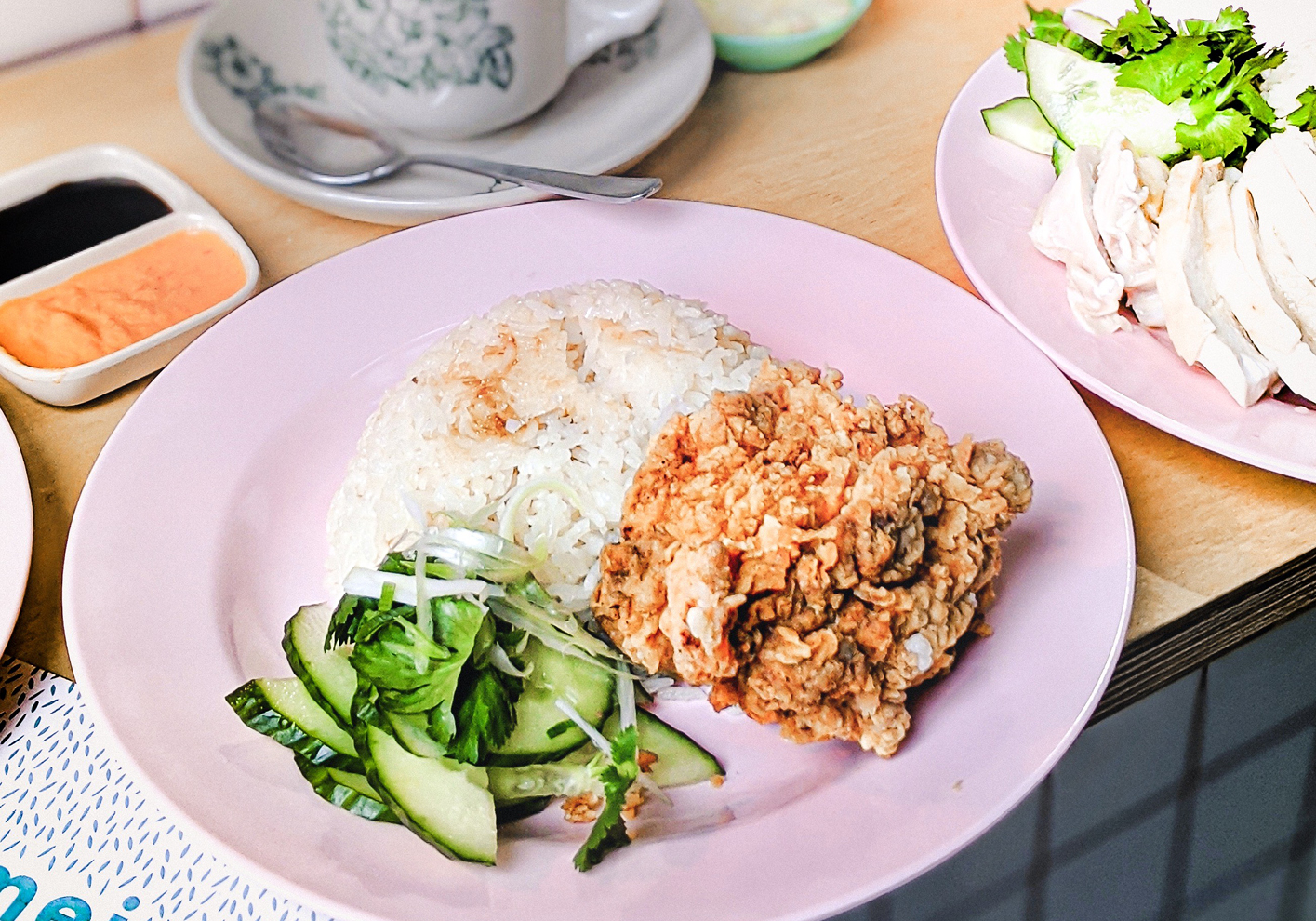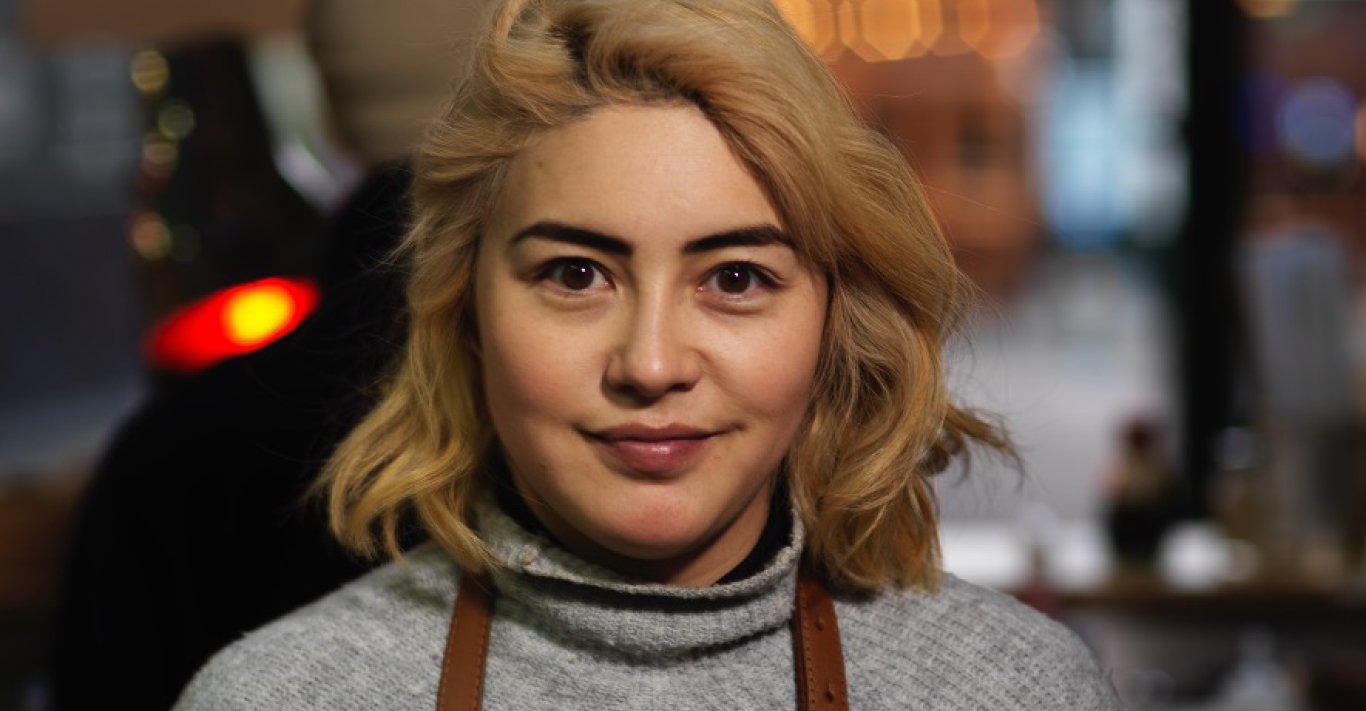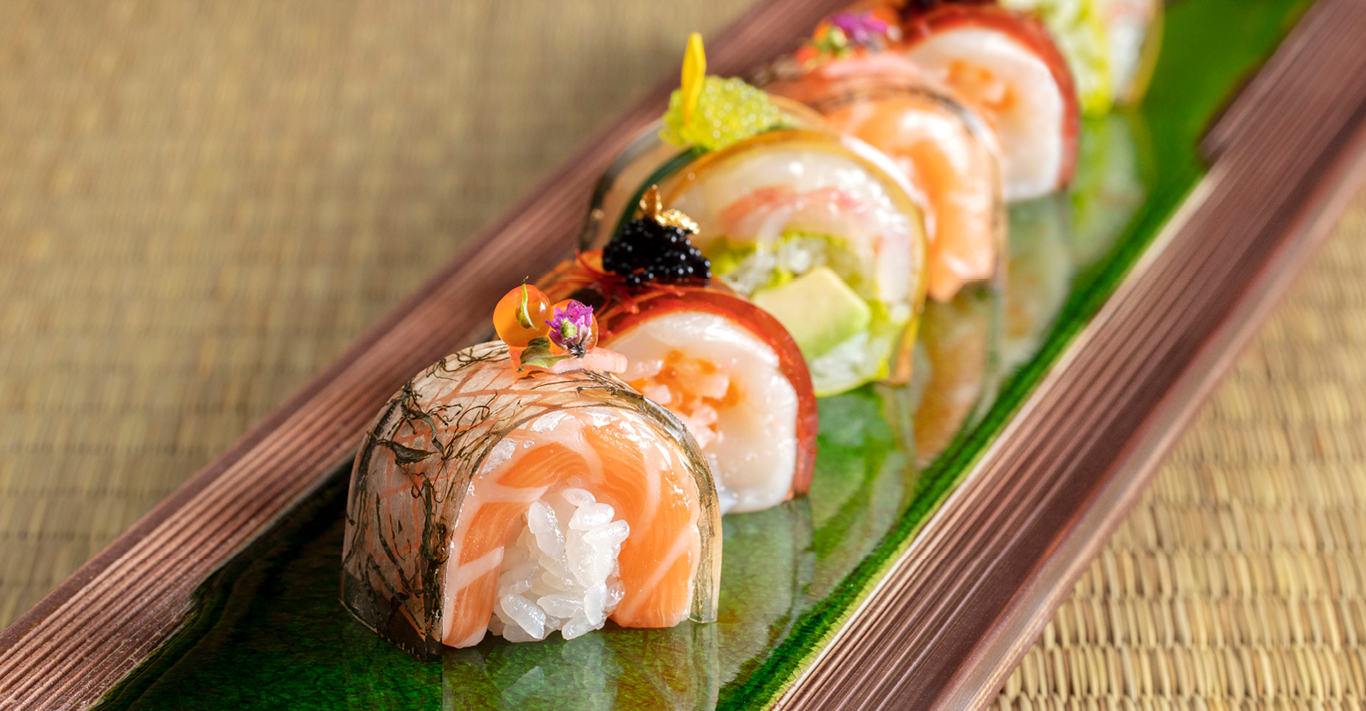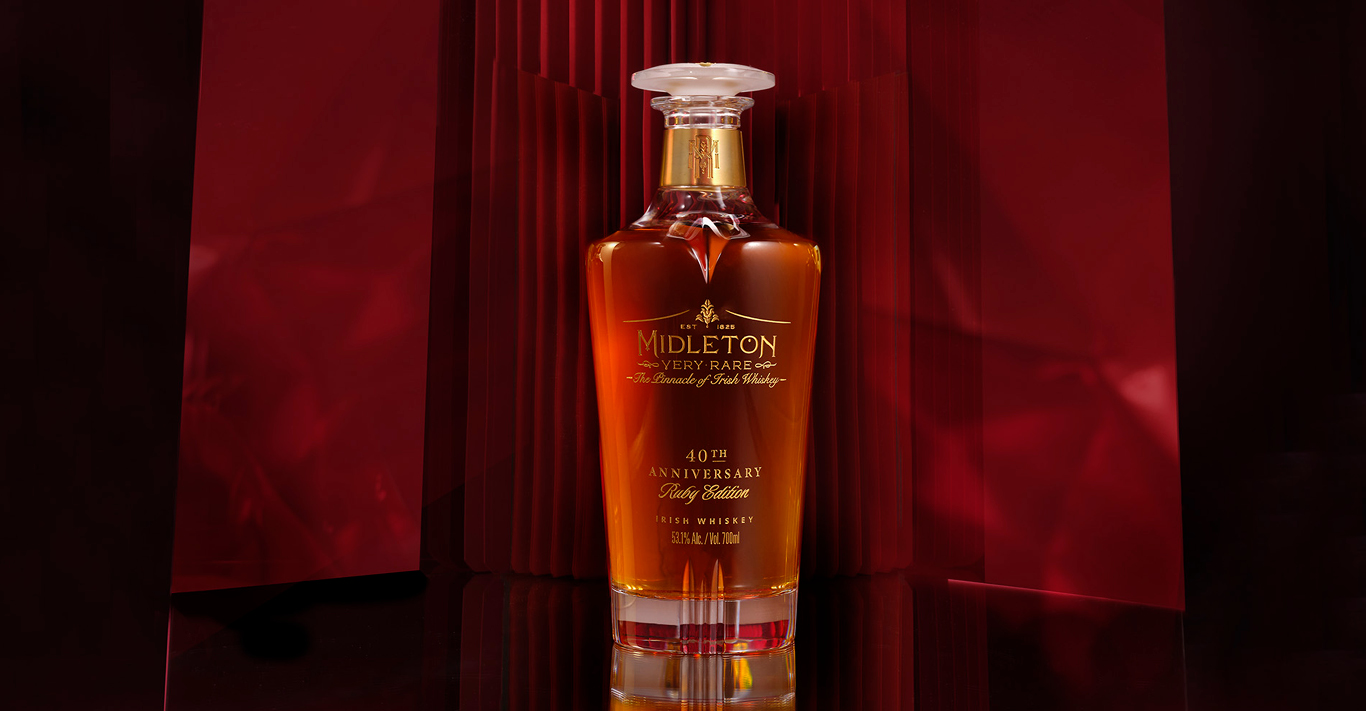WORDS
Lucy Frith
How has your South East Asian heritage influenced the concept and dishes at Mei Mei?
Mei Mei is a term of endearment, it means ‘little sister’. I am eldest of three sisters and so it fits entirely with the work I was doing at the time. East or South East Asian (ESA) cuisine is underrepresented. Try to specify what Singaporean food is like was always difficult so the concept of Mei Mei is from the heart. My whole entire career is focused on French, traditional cuisine. I wanted to learn the basics and that is the birthplace of becoming a chef. When I spoke to my family in Singapore, they cook one dish but they are masters of it. To me, I see these incredible master chefs but to them they are just a cook, it’s not glamorous, it’s just a way of living. And I kind of wanted to capture part of that heritage of having these dishes. The menu is limited but done very well. It’s putting the 10,000 hours in. We wanted to educate the UK about the Singaporean coffee culture and our food and lingo. A lot of the coffee lingo is different to what you have here. Hainanese chicken rice is what we serve at Mei Mei. Singapore is a lot like London in that there is a multicultural mix of cuisines, diverse and we’re all coming together and creating this one awesome city of food. But Hainanese chicken rice is one of the national dishes and is the ultimate comfort dish. If ever we were low or wanted a treat growing up, my mum would cook it.
What were mealtimes like for you growing up?
It was always the best time of the day. My mum and dad always worked really hard as well as bringing up three girls so mealtimes would be like us regrouping and coming back together. We were super active and we’d always do sports after school and we’d come home and be famished and dinner would always be ESA Monday to Saturday. And Sunday was religiously Sunday roast. It was a treat for us. I didn’t eat chips until I was a teenager. Once, I went to a friend’s house and had beans on toast for dinner, I was so baffled to have toast for dinner! It was a completely different food culture. Anyone who is Singaporean loves food.
How important is bringing that sense of culture and community to London?
We wanted to teach everyone about our coffee culture. I designed the coffee cups at Mei Mei to have the whole lingo broken down. When people come and say coffee with less sugar so I’d mark it with Sudai, which means less sugar. And people get used to that culture and start using the lingo too. It also shows the ESO community that we are representing them. We’d love to completely embrace that community and that this is something that can grow as big as any other cuisine. We would love to do a lot of events whenever we are able to keep expanding. There are a few concepts I have up my sleeve to keep expanding. Mei Mei is a rice specialist and so there’s lots of stuff that I want to do. It’s just scratching the surface, we have so much influence. We’ve only just scratched the surface in a way. There is so much we can dive into with Singaporean cuisine. It means there is no glass ceiling. The past year we have been playing stalemate. I was hoping by this point we’d have two or three other sites we’ll get to that bit eventually.
Mei Mei has been active throughout the pandemic serving food for takeaway and delivery, and you have been very hands on in the kitchen yourself, how has your approach to work changed as a result?
There was a lot of uncertainty. It’s hard as a business owner to ask anyone to come to work when they’ve got those concerns. It’s my business and it’s my problem. I’ve always been hands-on. When the pandemic happened, we’d only been open four months and it wasn’t in my nature to just sit back and not do anything at all. We’ve had the advantage of being part of Borough Market, so it’s a place where people can come and shop safely. It took a while. We adapted and did some home cooking around my local neighbourhood for the vulnerable. I developed the retail side of things before lockdown. That was quick to get out and I’m glad we did it. I think last year was one giant lesson of what we can and can’t do. It was a real pressure point and we got to really pressure-test everything that we were good and bad at. Simplicity has really been the key. When we opened, we had great reviews but everyone was going to forget those reviews as soon as lockdown happened. We needed to keep top of mind and innovating and working as hard as we could. We couldn’t get loans, we had debts, we had full rent to pay. You can’t sit back and wait for a hand-out. I don’t shy away from a challenge and hard work so I dug my heels in. We’re grateful that furlough was a success. A lot of entrepreneurs have lost out.

Last half term, you personally worked in the kitchen at Mei Mei supplying free hot meals and packed lunches to children of struggling families. How important is it to you for Mei Mei to play a key role in supporting community?
I love that our industry can band together and do what we can. I was happy that I was in a position to be able to help and do something. I’d rather feed one or two people than none at all. We started to do community boxes and on our website we have an option to pay for a box. We work really closely with a church down the road who runs a community co-operative and whatever they need, they message me, I’ll try and get it for them. They need more cash, I’ll do a fundraise. What we did with the school meals, I used the network of chefs in the industry that I had built up a network of people and a reputation so I might as well use it for good. We’re all in a pandemic so we should all just be kind. I am really lucky that we were able to do that. It’s my little bit of giving back and now I have this great relationship with the cooperative. £1,000 can feed 100 families and if you can help, why not? I’m really happy that we can keep working with them. I would hate to be in that position thinking that you just haven’t got.
What are the biggest lessons you have learned from the uncertain nature of the past year?
It is so important to constantly innovate and keep a product moving. During the pandemic we did the whole Kaizen process, which we usually do once a month, but we did it daily. We’ve learnt a lot. Even the smallest things can get improved. You have to stay one step ahead. What was most frustrating was not knowing what was going on. We had to spend a lot to constantly adapt.
How have your collaborative experiences helped to evolve the way you work and cook?
Collaborations in the past have definitely opened my eyes to the way people work. We have done a lot of pop-ups, events with other chef. It was interesting to see how they structure their work and business that’s definitely helped us move forward; how I want to run my business. I see what I like and what I don’t like very clearly. I pick up things like ‘oh that’s good the way they’ve structured their set up for service or how they interact with customers.
What can we expect from your upcoming book Makan?
My mum would always shout, ‘Makan, Makan’, which means ‘dinner time’ or ‘let’s eat’. It’s a book of the dishes that me and my mum cook at home, our solid favourites. I have had to adapt some of these dishes using British ingredients. Mostly all the vegetable dishes are different because we have completely different vegetables here to in Singapore. My mum never wrote any of her recipes down, it was all in her head, and she kept everything secret so it took me ages to get her to tell me what was in it. It was the hardest book I’ve ever tried to write. It was harder finishing it during lockdown.When I got the book deal, I wanted to go back to Singapore, I wanted to get some old family photos and get some tips from the Hawkers and master chefs out there but in the end I didn’t really need to. I didn’t want it to be too complex. There are lot of unique food to ESA food. The methodology is different. The recipes are flexible: if you want it sweeter make it sweeter, have it how you would like to eat it. The trouble with Singaporean cooking, people say ‘is it authentic’ I mean, what is authentic any more? You have to use the ingredients that are available. Trying to cook with ingredients that I have. I have a real love for these dishes so I am just trying to give these recipes respect.
What is the best piece of advice you’ve been given in your career and why?
Listen to your gut. When I felt the treatment I got as as a young chef wasn’t right, I was right. I knew in my gut that we had to keep everything moving. If I could go back a couple of years ago, I would say, start of small and grow the business don’t expect to be raining money from the get go. You need a lot of patience.
Who is your role model?
My mum is my biggest role model. She has a tenacity and a hard working nature, combine that with my stubbornness and that has definitely influenced my work. Having to raise three girls in a new country and make fresh meals, and it wouldn’t be one dish, it would be six dishes on the table: a rice dish, a meat dish and a soup dish, every night. As I’ve become a mother myself, I can see how much she has done for us. If I can give my son Riley the same childhood as I’ve had then what more can you ask for? My mum is a great cook. She used to watch her grandmother and her mother cook. My grandmother had a roast duck stall in a wet market and used to sell vegetables as well, for them it’s just second nature cooking those dishes. Because a lot of people in Singapore can go out to eat, many don’t know how to cook those traditional dishes any more and it’s important to keep the essence and heart of those recipes and methodology alive. I want to pass it on to Riley and I want him to pass them on to his family. That represents our community and our heritage so it would be a shame if they were lost
What ingredient you can’t live without?
Rice. It’s the heart of a lot of the dishes that we do. It’s the carrier for a lot of things and there is something humble about it. You can make it delicious and it very understood.
Apart from your passport, what item can you not travel without?
I always travel with a notebook actually. I have a collection of them. When I travel, it’s always food related, I get a lot of ideas. There’s a lot of time sat somewhere so I write anything down. I tell my chefs, ‘If you’ve got ideas just write it down’, sometimes inspiration just comes to you. I used to be an artist. I used to paint and draw a lot, which got me into architecture. I love doodling and drawing dishes and restaurant design. It’s quite nice to keep a journal – my art school tutor taught me that. He would say write down anything that gives you inspiration, that has stemmed into the business. I’ll draw something or write something and use it as a stimulus. What could come from that? I think that’s where Kaizen House grew from so I love travelling with my notebook. You’ve got to draw it out, it’s almost like the anatomy of a dish, then you work out the hard bit of cooking it after that.
Where is your favourite place to eat in London?
I love Elliots, they are our neighbours, I absolutely adore their food, company and wine, they are really lovely people. For me that’s the ultimate neighbourhood restaurant. We’ve grown to be close throughout the pandemic. We love eating at Rochelle’s Canteen because of the outdoors and the food. We did The Smoking Goat a lot. I could name hundreds of restaurants I love.
What do you like to do on a day off?
If I don’t have anything planned I get a bit edgy, I like to know what I’m doing today. At the moment, I like going to the playground with my son and my husband and we’ll go to the farm shop or the fishmongers. Sometimes we’ll get the best pick of what’s available at Borough Market and then spend a Sunday gorging. We basically just eat on my day off.
What apart from food is your biggest passion?
Family, and I love art. I wish I had more time to get back into painting or drawing or sculpture. I’d love to do pottery and make my own plates for the restaurant. I’d love to travel again, we’d plan holidays around food. I’d book a restaurant in a city, it’s an expensive meal but it’s worth it. There’s so many places I’d love Riley to see as well.
Who is your ideal dinner party guest and why?
Anthony Bourdain. He was the ultimate traveller and loved food, I could pick his brains so much, what he loves and what he doesn’t love. He was obviously as passionate about food as me. There’s so much we could talk about from one foodie to another.
What cookbook do you recommend and why?
Apart from Makan, it would be Mandalay: Recipes and Tales from a Burmese Kitchen by Mimi Aye. It’s another story that is beautifully told and I don’t know much about Burmese food and I think it is fascinating. I’ve got thousands of chefs cookbooks, but there is something really lovely about her book that I keep reading and doing recipes from.




